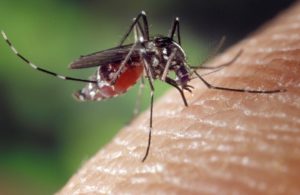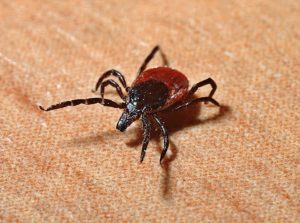Tips to Survive Mosquito, Tick and Chigger Season
Spring is a time of rebirth and renewal, flowers are blooming and trees are starting to bud. However with the arrival of spring and the warm weather comes an increased risk of tick-borne illnesses.
Ticks are typically tiny, blood sucking parasites/insects that are found in grassy or wooded areas. They attach themselves to a host (human beings or animal) and feed on their blood. These ticks unfortunately carry a variety of diseases that can be harmful to humans. Examples of these tick-borne illnesses include Lyme disease which is transmitted to humans through the bite of an infected black-legged tick. Symptoms of this disease vary widely but often include fever, headache, fatigue and a bull’s eye rash.
If left untreated, Lyme’s disease can lead to serious complications like joint pain and heart problems.
Another common tick-borne illness to be aware of is Rocky Mountain Spotted fever (RMSF), the disease gets its name from where it was first identified however it is seldom seen in that region and most cases are reported in the Eastern and Central states including Kansas, Missouri, Georgia, Tennessee, Arkansas, Virginia, North and South Carolina and Oklahoma.
RMSF is transmitted to humans through the bite of an infected American dog tick or Rocky Mountain wood tick. Symptoms include fever, headache, muscle pain, rash and vomiting. If untreated, this disease can be fatal.

Other tick borne illnesses include Babesiosis, Anaplasmosis and Powassan virus which can also cause a range of mild to severe symptoms and can be quite difficult to diagnose.
According to the Kansas Department of Health and Environment, “West Nile Virus is the most common mosquito-borne disease in Kansas and the United States.” Kansas falls in the 3rd 20th percentile nationwide of reported mosquito and tick disease cases.
While the risk may appear minimal, taking precautions are well worth the investment as tick bites and mosquitoes can transfer some very uncomfortable diseases. Chigger bites can cause extreme itchiness and can take months for the scabs and scarring to dissipate.
Here are some top tips from the Centers for Disease Control and Prevention and the Kansas Department of Health and Environment to help keep you bite-free this summer.


Remember RIPS: REPEL-INSPECT-PREVENT-SHOWER
Before you go outside:
- Take a few moments and consider the environment you will experience and consider where you may encounter ticks, mosquitoes and chiggers.
- Wear a hat, long sleeves and pants. Tuck your pants into your socks, wear light-colored clothing so ticks can easily be seen.
- Walk in the center of trails to avoid overhanging grass or bush(es).
- Check your body as well as your pet’s every few hours for ticks when you spend a long time outdoors.
- Ticks live in grassy, bushy, or wooded areas, or even on animals. Walking your dog, camping, gardening, or hunting could expose you to come into contacts with ticks.
- Ticks can also be hitchhikers on your backpacks, socks, clothing, hats and other equipment.
- Many people get ticks in their own yard or neighborhood. Similarly, mosquitoes are encountered in many places including your yard, trees, shrubs and shady areas.
- Chiggers also love a less-than-sunny environment with plenty of moisture.
Wear insect repellent:
- Look for products that contain one of the following ingredients: DEET, Picaridin, IR3535, Oil of lemon eucalyptus (OLE), Para-menthane-diol (PMD) or 2-undecanone and apply it under your clothing and on top of any sunscreen you may be wearing.
- Cover your face, neck and ears as well as the extremities and torso.
- When used as directed, EPA-registered insect repellents are proven safe and effective even for pregnant and breastfeeding women. For more information: https://www.epa.gov/insect-repellents
Protect yourself around the home:
- Use air conditioning as much as you can.
- Check and fix any window screens that can allow the passage of insects.
- Clear the outside of your home of standing water at least weekly, empty and scrub, turn over, cover, or throw out items that hold water, such as tires, buckets, planters, toys, pools, birdbaths, flowerpots, or trash containers.
Treat clothing and gear:

- Treat items such as boots, pants, socks, and tents with permethrin or purchase permethrin-treated clothing and gear.
- Permethrin-treated clothing will protect you through multiple washings but refer to the manufacturer’s information to determine the length of effectiveness.
- Treat your outdoor gear with Permethrin by following the instructions and taking safety precautions.
- Do not use permethrin products directly on skin.
- Although chigger larvae can penetrate many types of clothing, high boots and trousers of tightly woven fabric, tucked into stockings or boots, help deter them.
Protect your baby or child:
- Always follow instructions when applying insect repellent to children.
- Do not use insect repellent on babies younger than 2 months of age.
- Dress your child in clothing that covers arms and legs.
- Cover crib, stroller, and baby carrier with mosquito netting.
- Do not apply insect repellent onto a child’s hands, eyes, mouth, and cut or irritated skin.
- Spray insect repellent onto your hands and then apply to a child’s face.
- Do not use products containing oil of lemon eucalyptus (OLE) or para-menthanediol (PMD) on children under 3 years of age.
After you come inside:
Shower within two hours of coming inside as this activity has been shown to reduce your risk of getting Lyme disease and may be effective in reducing the risk of other tick-borne diseases. Some believe that this also will help reduce the severity of a chigger attack. Be sure to use plenty of soap and make it as hot as is comfortable. Showering also may wash off unattached ticks and is a great time to do the tick check.
Examine yourself and your children for ticks as soon as possible after returning inside and pay special attention to areas under the arms, in and around the ears, navel, backs of knees, hairlines, and around the waist and between the legs. Chiggers are nearly invisible to the naked eye, so you will need to look for small bite marks.
Wash your clothes as soon as possible in hot water and dry on high heat for a minimum of 10 minutes. Cold or warm water will have little effect on ticks or chiggers.
Ticks can hitchhike into the home on clothing and pets, then attach to a person later, so carefully examine pets, coats, and daypacks.
Don’t be afraid
Spring is a beautiful time of the year, enjoy it; but please take precautions to keep yourself and your loved ones safe.
